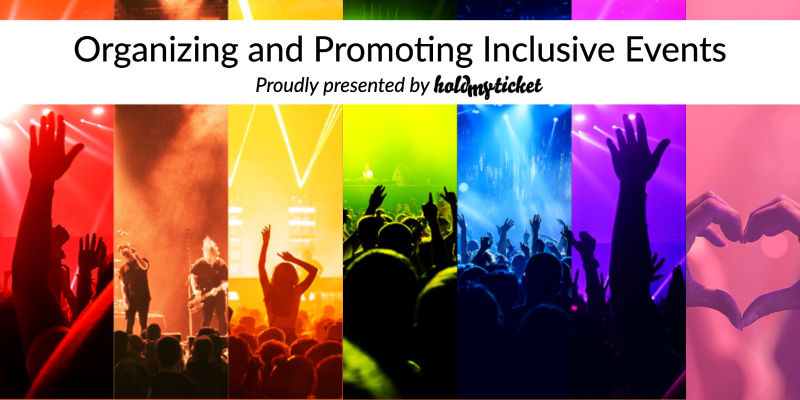Organizing and Promoting Inclusive Events
 Events bring people together.
Events bring people together.
Anyone should be able to attend any concert, festival, or conference comfortably and authentically as themselves. Creating welcoming and inclusive events enables everyone to enjoy a shared experience, strengthening the bonds of community.
Your event does not have to be centered on a particular theme or take place at a specific time for inclusivity to be a major consideration. Organizing inclusive events demonstrates your respect to all ticket-buyers. Incorporate inclusion in your event with these inspiring suggestions:
- Be intentional when it comes to inclusivity at your event, developing goals to guide you during your planning process and approaching them with genuine intentions.
- Consider what you hope to achieve by developing an inclusive event, including whether it’s to raise awareness, celebrate a particular community, or simply ensure people enjoy your event regardless of their identities and backgrounds. Once you know what you want to achieve, you can start to plan your event accordingly.
When choosing a venue for your event, make sure it is one that is welcoming to all people. Research venues to ensure they have a history of supporting and including marginalized communities. Make sure facilities are safe and accessible for everyone, including the LGBTQ+ community and individuals with disabilities.
- Provide gender-neutral restrooms and make sure that your event is free from discrimination and harassment.
- Check that your event venue is accessible to people with disabilities, with all aspects of the event being able to accommodate various levels of need and mobility.
Creating a truly inclusive event requires involvement from people who are a part of different communities to forge a more welcoming and inclusive environment for all attendees. Involve marginalized peoples in the planning process for your event to help ensure that your event is truly inclusive and representative of the several intersecting communities.
- Reach out to community organizations about partnering for your event. These organizations can provide you with valuable resources and insights on how to make your event more inclusive.
- Recruit people with different identities and backgrounds, such those who identify as LGBTQ+, disabled or BIPOC, to partake in your event planning and to join your list of performers.
Research performers, vendors, sponsors and other potential partners or participants to ensure your event will not be working with someone who has harmed or discriminated against marginalized groups. Be careful not to platform or give the spotlight to someone who has expressed views antithetical to your inclusivity goals.
- Choose collaborators who have demonstrated continual interest in creating an inclusive event and atmosphere, and support of people from diverse backgrounds.
- Pay attention to any protests or controversies surrounding any potential partners, listening carefully to anyone who says they’ve been harmed by discriminatory actions or words, keeping in mind the intersectionality that exists amongst many marginalized communities, and how support or harassment of one can impact another.
Be mindful of your language and imagery in every aspect of your event. Utilize inclusive language that does not discriminate or encourage harassment against minorities and marginalized people, including members of the LGBTQ+ and disabled communities throughout your marketing, event management and interactions with customers. Ensure any representation of these communities is fair, accurate and does not do harm to their members.
- Beware of any words or phrases, images or symbols that are offensive to marginalized communities, avoiding any faux pas, tropes or stereotypes. Listen to any feedback or concerns expressed by community members. Use gender-neutral language and avoid using stereotypes or clichés. Avoid gendered language, such as "ladies and gentlemen," or "boys and girls." Instead address your ticket-buyers as guests, participants, or fans. You can also consider simply addressing people as everyone or you all.
- Be respectful of each person’s pronouns, ensuring you always identify performers and participants as they wish. Always ask people for clarification rather than making assumptions about someone’s gender, ethnic or racial identity, while giving people the chance to decline answering. Never press attendees for personal information; if you’re including a survey as a part of your ticket, allow any questions regarding gender or sexul orientation, race, ethnicity or disability to be optional.
Creating events at which people feel at ease may require some extra thought or work for organizers, but planning and promoting inclusive events shows you respect all attendees. A safe and welcoming environment is always worth proudly celebrating.
